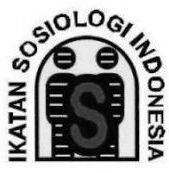Implementasi Bahan Ajar Berbasis Web pada Mata kuliah Pembangunan dan Pemberdayaan Masyarakat di Jurusan Pendidikan Sosiologi Untirta
Abstract
Artikel ini merupakan hasil penelitian yang menggunakan metode Research and Development (R & D). Tujuan penelitian ialah untuk mengetahui efektifivitas bahan ajar berbasis Web pada Mata Kuliah Pembangunan dan Pemberdayaan Masyarakat. Bahan Ajar Berbasis Web sebelum digunakan, telah melalui tahapan validasi yang dilakukan oleh ahli media dan ahli materi. Setelah di validasi oleh ahli media dan ahli materi, kemudian bahan ajar berbasis web di uji cobakan pada mahasiswa Jurusan Pendidikan Sosiologi Universitas Sultan Ageng Tirtayasa, tahapan uji coba meliputi ujicoba terbatas dan ujcoba secara luas.
Uji Keefektifan Bahan Ajar menggunakan t test (Uji- t) pada taraf signifikansi 5% , diperoleh thitung sebesar 42,566 dan ttabel sebesar 2,064. Hal ini menunjukkan bahwa thitung> ttabel .
Dapat disimpulkan bahwa bahan ajar berbasis web terbukti efektif pada mata kuliah pembangunan dan pemberdayaan masyarakat.Kata Kunci: pembangunan dan pemberdayaan masyarakat, sosiologi pembangunan, pembelajaran berbasis web.
Abstract
This article was the result of research using the Research and Development (R & D) method. The purpose of the study was to determine the effectiveness of Web-based teaching materials in the Development and Community Empowerment Course. Web Based Learning Materials before being used, have gone through the stages of validation carried out by media experts and material experts. After being validated by media experts and material experts, then Web-based teaching materials were tested on students of the Department of Sociology Education at Sultan Ageng Tirtayasa University, the stages of the trial included limited trials and extensive trials.
Teaching Materials Effectiveness Test using t test (t-test) at the significance level of 5%, obtained tcount of 42.566 and t table of 2.064 This indicates that tcount> t table.
Conclution of this study is that Web-Based Teaching Materials proved effective in development and community empowerment courses.Keywords: development and community empowerment, sociology of development, web-based learning
Full Text:
PDFReferences
Gall, M. D., Borg, W. R., & Gall, J. P. (1996). Educational research: An introduction. Longman Publishing.
Darajat, Z. (2002). Ilmu Pendidikan Islam Sejak Dini. Jakarta: AH Ba’adillah Press, Cet. I.
Darmadi, H. (2013). Metode Penelitian Pendidikan dan Sosial. Bandung: Alfabet.
Hadjerrouit, S. (2010). Developing web-based learning resources in school education: A user-centered approach. Interdisciplinary Journal of E-Learning and Learning Objects, Volume 6.
Hamalik, O. (1994). Media Pendidikan. Bandung: PT. Citra Aditya Bakti.
Kay, R., Knaak, L., & Petrarca, D. (2009). Exploring teachers perceptions of web-based learning tools. Interdisciplinary Journal of E-Learning and Learning Objects volume 5, 27-50.
Mason, Robin & Rennie, Frank (2006). Elearning: the key concepts. Key Guides. London and New York: Routledge.
Mbulu, Joseph dan Suhartono (1994). Pengembangan Bahan Ajar. Malang : Elang Mas.
Ramayulis, S. N. (2011). Filsafat Pendidikan Islam. Jakarta: Kalam Mulia.
Ruslan, R (2007). Manajemen Publik Relation dan Media Komunikasi. Raja Grafindo Persada: Jakarta.
Sadiman, A. S. (2009). Media Pendidikan: pengertian, pengembangan, dan pemanfaatannya. Jakarta: PT. Raja Grafindo Persada.
Setiawan, Rizki (2017). Kebebasan Ekspresi Individual dalam Pembangunan Manusia Era Digital. Prosiding Seminar Nasional Pendidikan FKIP UNTIRTA 2017.
Sugiyono. (2017). Metode Penelitian & Pengembangan Research and Development. Bandung: Alfabeta.
Sutopo, A. H. (2012). Teknologi informasi dan komunikasi dalam pendidikan. Yogyakarta: Graha Ilmu.
DOI: http://dx.doi.org/10.30870/hermeneutika.v4i2.4826
Refbacks
- There are currently no refbacks.
Copyright (c) 2018 Hermeneutika : Jurnal Hermeneutika
Published by Department of Sociology Education, Faculty of Teacher Training and Education, Universitas Sultan Ageng Tirtayasa
Jl. Ciwaru, No. 25, Serang, Banten
[email protected]
Jurnal Hermeneutika is licensed under a Creative Commons Attribution 4.0 International License
Hermeneutika : Jurnal Hermeneutika Indexed by:



.png)









